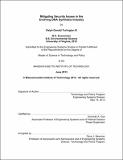Mitigating security issues in the evolving DNA synthesis industry
Author(s)
Turlington, Ralph Donald, III
DownloadFull printable version (1.505Mb)
Other Contributors
Massachusetts Institute of Technology. Engineering Systems Division.
Advisor
Kenneth A. Oye.
Terms of use
Metadata
Show full item recordAbstract
DNA synthesis technologies are advancing at exponential rates, with production of ever longer, more complex, and less expensive sequences of double stranded DNA. This has fostered development of industrial scale design, construction, and sale of synthetic DNA. The tools and methods of synthesis used to create beneficial genetic material can also be used to construct dangerous pathogens. To prevent unknown actors from ordering potentially dangerous genetic material, the largest DNA synthesis firms formed two industry associations that require members to screen the DNA sequences ordered and the customers ordering sequences. The firms also worked with the U.S. Health and Human Services to formulate voluntary screening guidelines for synthetic double stranded DNA. As DNA synthesis technology advances and diffuses, this centralized voluntary approach may become less effective. This thesis identifies strengths and weakness in the current voluntary regime and offers recommendations to improve security in the DNA synthesis industry. It describes the origins and current status of DNA synthesis technologies and the structure of the DNA synthesis industry. Then, it describes the formation of voluntary screening consortia and the U.S. and international guidelines that address security issues in DNA synthesis. Finally, this thesis compares DNA synthesis with other potentially "dual use" technologies, concludes that regulatory approaches may not enhance security in this area, and suggests that governments should focus on education and outreach.
Description
Thesis (S.M. in Technology and Policy)--Massachusetts Institute of Technology, Engineering Systems Division, 2013. This electronic version was submitted by the student author. The certified thesis is available in the Institute Archives and Special Collections. Cataloged from student-submitted PDF version of thesis. Includes bibliographical references (p. 102-108).
Date issued
2013Department
Massachusetts Institute of Technology. Engineering Systems DivisionPublisher
Massachusetts Institute of Technology
Keywords
Engineering Systems Division.